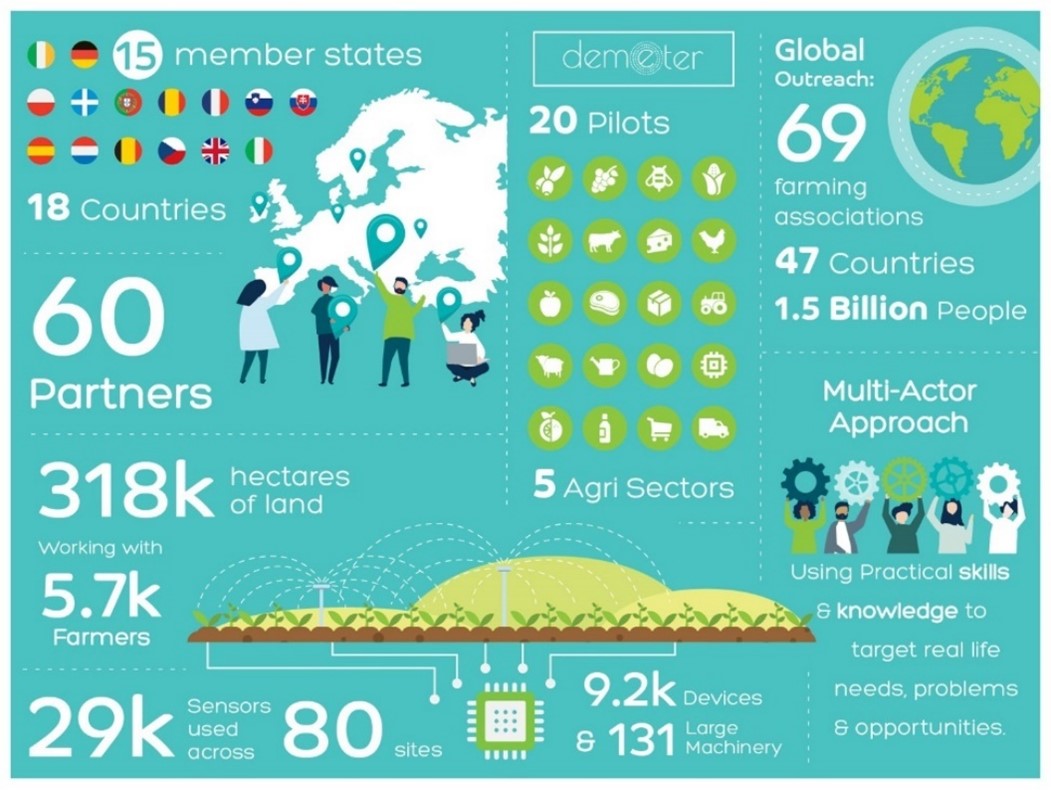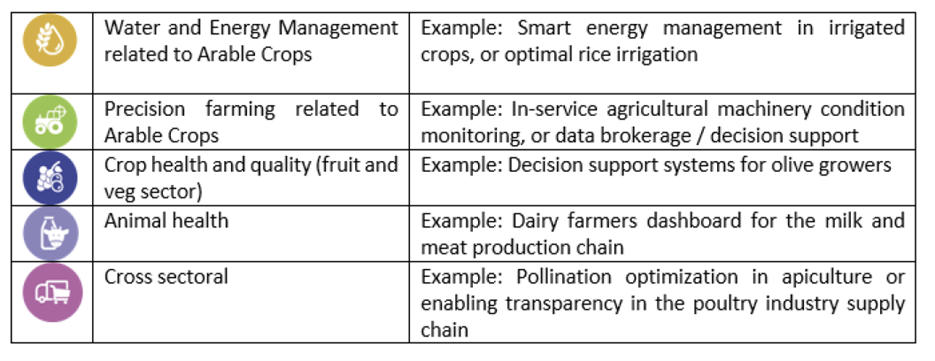

A top goal for the EU is to support sustainable agriculture and food production, protect natural resources and boost food safety. Smart farming via GPS, soil scanning, data management, and IoT technologies could help attain the EU goal of ameliorating the quantity and quality of farming production.
The EU-funded DEMETER is a large-scale project deployed in 18 countries, 15 of which are EU member states. The project analyses data obtained from a wide range of actors (production sectors and systems) to provide an integrated interoperable data model enabling optimal resource management in the European agri-food sector.

Source: https://cordis.europa.eu/project/id/857202/reporting
DEMETER aims to put digital tools at the service of farmers:
The DEMETER consortium consists of 60 partners bringing together farmers and farmers’ organisations, academic institutions, and small and large public and private organisations representing demand and supply sides. Led by project coordinator Walton Institute, the partners deliver a significant outreach capability globally, to cover a representative sample of the stakeholders needs and demands, thereby answering market potential and innovation.
The DEMETER pilot projects are used to demonstrate and evaluate how innovations and extended capabilities benefit from the interoperability mechanisms. The pilots, running across 18 European countries (Belgium, Czech Republic, Finland, Georgia, Germany, Greece, Ireland, Italy, Latvia, Montenegro, Norway, Poland, Portugal, Romania, Serbia, Slovenia, Spain, Turkey), are also used to monitor the evolution of the maturity in the stakeholders involved.
The pilots are grouped into 5 clusters: arable crops, precision farming in arable crops, fruit and vegetable production, livestock (poultry, dairy, animal welfare) and the supply chain.

More information: https://h2020-demeter.eu/wp-content/uploads/2020/02/DEMETER_PilotBooklet_ENG.pdf
DEMETER offers several advantages to farmers, whether they are "small" or "large" farmers; dairy, poultry, fruit and vegetable producers or farmer; young or older farmers:
DEMETER is a European-funded project which aims to empower farmers and farmer cooperatives in two main ways. First, by allowing farmers to use their existing machinery and platforms to deliver new, integrated knowledge to help decision-making. Second, by easing farmers’ updating or acquisition of machinery, platforms and sensors ensuring technologies speak a common language meaning they can be easily connected, combined, and cooperate with each other.
DEMETER gives farmers control of their data opening up new business models and new possibilities in collaboration and cooperation.
Website: https://h2020-demeter.eu/contact/
Arclabs Research & Innovation Building, WIT, West Campus, Carriganore,
Waterford, X91 P20H, Ireland
Telephone: +353 (0)5130 292
Email: info@h2020-demeter.eu
Angela Ivanova (INI-Novation GmbH)
Funded by the European Union. Views and opinions expressed are however those of the author(s) only and do not necessarily reflect those of the European Union or the European Education and Culture Executive Agency (EACEA). Neither the European Union nor EACEA can be held responsible for them.
Project number: 2021-1-DE02-KA220-VET-000034651
All AgriSkills Intellectual Outputs are Open Educational Resources.
Creative Commons Attribution-Non-Commercial-Share-Alike 4.0 International License.
Google Play and the Google Play logo are trademarks of Google LLC.